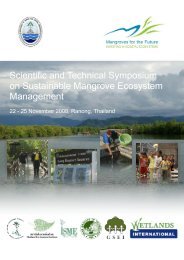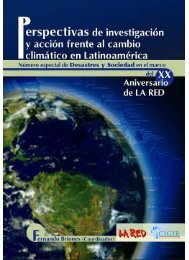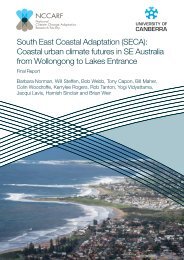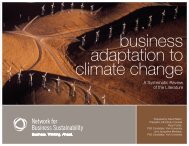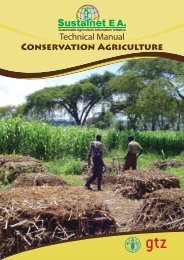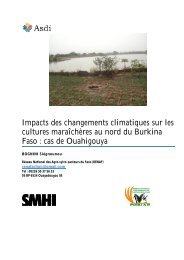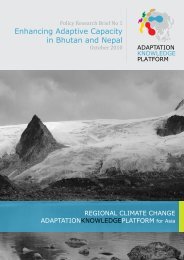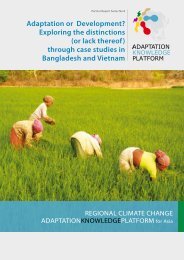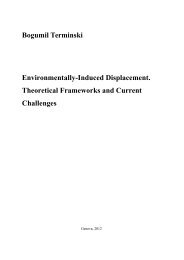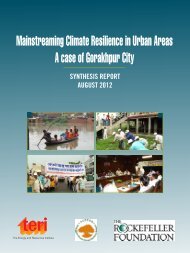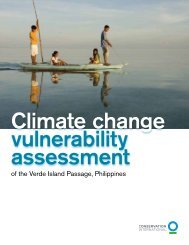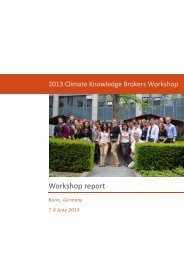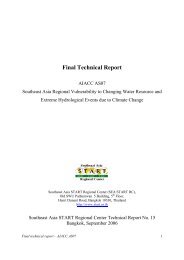no place under the panoply of practices, they more often expressed interests inactivities that they had not previously heard of or considered in this way.4.2.6 What are the barriers to more widespread adoption of <strong>urban</strong>agriculture in Australian cities?The research has revealed that, with few exceptions, participants firmly believe that<strong>urban</strong> <strong>and</strong> peri-<strong>urban</strong> agriculture has a significant, <strong>and</strong> in many cases, highlysignificant, role to play in <strong>climate</strong> <strong>change</strong> adaptation <strong>and</strong> mitigation; in meeting current<strong>and</strong> future <strong>food</strong> <strong>security</strong> needs of the growing city; <strong>and</strong> in building a sustainable, fair<strong>and</strong> resilient <strong>food</strong> system for the future.Participants identified three main sets of barriers that we can classify as political,economic, <strong>and</strong> cultural.The principal political barrier is the perceived lack of any strategic vision for asustainable <strong>and</strong> resilient <strong>food</strong> system, in the two case study cities or their respectiveestates. As discussed below in relation to peri-<strong>urban</strong> agriculture, this expresses itselfmost acutely in relation to the expansion of the <strong>urban</strong> growth boundary over primefarml<strong>and</strong>; but it is seen more broadly in the failure to fully integrate considerations ofhealth <strong>and</strong> well-being into state <strong>and</strong> federal planning <strong>and</strong> policy frameworks.The previous government of Victoria (Brumby administration) attempted to establish astate-wide, whole-of-government, integrated <strong>food</strong> policy. Some interviewees suggestedthat this policy initiative ‘ran into the s<strong>and</strong>s of obstructionism’ from within theDepartment of Primary Industries which was not convinced of the need for it.So we had a reasonable commitment to doing this. But it really just dragged. Andwhen I look back now to some of the stuff we’d come up with, <strong>and</strong> got committedto in regional policy <strong>and</strong> <strong>climate</strong> <strong>change</strong> <strong>food</strong> strategy, that we will do this wholeof-government<strong>food</strong> strategy, <strong>and</strong> we do underst<strong>and</strong> why we’re doing it, <strong>and</strong> it hasstrong links to <strong>climate</strong> <strong>change</strong>, <strong>and</strong> everything else – now we know that DPI wasjust basically stalling it, at every possible opportunity. You’d have everythingagreed, everyone on side, <strong>and</strong> then you’d get this memo, saying, you can’t havethis, why don’t you re-write it like that. And we’d be completely back to scratch.And there was just dragging of feet, <strong>and</strong> heels – so much time <strong>and</strong> energy goinginto something, that was almost like a plaything at one level. They had to beforced. If the political will’s not there to really make it happen, it doesn’t matterhow much pushing you do up from the policy officer level. Yes, there was anincredible educational process for the people involved. We took that many peoplefrom traditional DPI, who thought that <strong>food</strong> <strong>security</strong> is just about choice, <strong>and</strong> ifpeople are fat, it’s because they’re eating the wrong <strong>food</strong>, through so manydiscussions of explaining, opening people’s heads … I’m sure it had a lot ofeducational benefits for a lot of people, but [ultimately] it didn’t deliver anything onthe ground [Former state government employee].In reflecting on the failure of this attempt to establish an integrated <strong>and</strong> holistic statewide<strong>food</strong> policy for Victoria, which would, amongst other things, have accorded aprominent role to <strong>urban</strong> <strong>and</strong> peri-<strong>urban</strong> agriculture, <strong>and</strong> in particular to the protection ofprime farml<strong>and</strong> close to the city, this interviewee identified a culture inside the State<strong>Urban</strong> <strong>food</strong> <strong>security</strong>, <strong>urban</strong> <strong>resilience</strong> <strong>and</strong> <strong>climate</strong> <strong>change</strong> 51
government, especially at more senior levels, which strongly militates against policy<strong>change</strong> of this nature:People would just say, agriculture’s DPI, but that wasn’t what I was talking about.So I really began to see how this h<strong>and</strong>balling phenomena worked insidegovernment; <strong>and</strong> that trying to get people to talk about complex issues who didn’thave clear lines of responsibility was very difficult. You can get thoseconversations happening at officer level, <strong>and</strong> maybe at manager level, but it’svery hard to get real openness to people above that [level] thinking outside thebox [Former state government employee].In Queensl<strong>and</strong>, the Newman government has commissioned an inquiry into the State’sagricultural <strong>and</strong> resource industries, but this focuses primarily on identifying <strong>and</strong>removing unnecessary regulatory barriers, <strong>and</strong> there is little recognition of l<strong>and</strong> useconflicts except in relation to tensions between famers <strong>and</strong> miners in, for example, theDarling Downs.In addition to important issues such as the loss of prime farml<strong>and</strong> to <strong>urban</strong> expansion,foreign ownership of agricultural l<strong>and</strong> <strong>and</strong> l<strong>and</strong> hoarding, interviewees also raised theissue of the corporate domination of the <strong>food</strong> system, <strong>and</strong> its impact on farmers,suppliers <strong>and</strong> consumers. The concentration of ownership within the Australian <strong>food</strong>system leads to the third barrier identified by interviewees, namely cultural factors ofwhich there are two principal aspects. One is the prevailing culture of cheap <strong>food</strong>, <strong>and</strong>the convenience of take-away, which can lead to widespread complacency about <strong>food</strong>,its provenance <strong>and</strong> availability <strong>and</strong> about issues of waste:Why do people buy so much <strong>food</strong> that they throw out? Why is there such adisregard for <strong>food</strong>? If you could turn that into dollars, people would certainly havea concern about how much they were throwing away [City of Yarra <strong>urban</strong>agriculture officer].This complacency leads to the second aspect of the cultural barrier which participantsidentified, a widespread lack of awareness of the key issues <strong>and</strong> problems concerningthe <strong>food</strong> system, <strong>and</strong> engagement with them:There is a real lack of awareness of the need to <strong>change</strong>. Most of the population isnot aware. People need to be more uncomfortable, or have barriers to actionremoved, such as cost incentives. It’s really troubling that so many people don’thave basic <strong>food</strong> growing <strong>and</strong> preparation skills. We set up a garden in aneighbourhood house, but a lot of people there will look at silverbeet <strong>and</strong> notknow what to do with it. And this applies across the wider population – we’relacking basic cooking, <strong>and</strong> <strong>food</strong> preparation, <strong>and</strong> preserving, skills. There’s apsychological shift that needs to happen, for people in general to value <strong>food</strong>growing as a worthy thing to do. People forget that there’s a farmer behind everymeal they eat [Permaculturalist <strong>and</strong> backyard gardener].Our interviews with the farmers <strong>and</strong> growers revealed, however, that <strong>urban</strong> sprawl wasnot their principal concern. Nor was <strong>climate</strong> <strong>change</strong>. Rather, it was the commercial,financial <strong>and</strong> regulatory pressures they were facing, which took the form of a so-called‘cost-price squeeze’ in which as the cost of inputs rose <strong>and</strong> the burdens of regulation<strong>Urban</strong> <strong>food</strong> <strong>security</strong>, <strong>urban</strong> <strong>resilience</strong> <strong>and</strong> <strong>climate</strong> <strong>change</strong> 52
- Page 1 and 2:
Synthesis and Integrative ResearchF
- Page 3 and 4:
Published by the National Climate C
- Page 5 and 6:
ABSTRACTFood security is increasing
- Page 7 and 8:
1. a review of the literature: on n
- Page 9 and 10: its Food for All project. This help
- Page 13 and 14: In response to the existential thre
- Page 15 and 16: 2. OBJECTIVES OF THE RESEARCHFood i
- Page 17 and 18: debates and to the more systematic
- Page 19 and 20: organisation in the past few years.
- Page 21 and 22: 4. RESULTSIn this section we presen
- Page 23 and 24: increasing productivity. Thus, whil
- Page 25 and 26: people and the origins of their foo
- Page 27 and 28: urban food supply chains. Thus, whi
- Page 29 and 30: This logistics system is dominated
- Page 31 and 32: Like Hodgson et al., as per definit
- Page 33 and 34: esilient, powerful by being locally
- Page 35 and 36: volume or even its contribution to
- Page 37: community food growing can have on
- Page 40 and 41: generations this history has been f
- Page 42 and 43: a stronger focus on addressing the
- Page 44 and 45: The third key aspect is fairness -
- Page 46 and 47: climate (which we live and work in
- Page 48 and 49: agriculture. Eight percent is in ur
- Page 50 and 51: This concept of the ‘spaces in be
- Page 52 and 53: esearch scientist and chair of the
- Page 54 and 55: As discussed above, protection of t
- Page 56: 4.2.5 What is the extent and the im
- Page 62 and 63: increased, the market dominance of
- Page 64 and 65: … the residents of S Park called
- Page 66 and 67: 5. CONCLUSIONSThere is growing conc
- Page 68 and 69: urban resilience. This inevitably c
- Page 70 and 71: In many respects these contrasting
- Page 72 and 73: Many interviewees of both standpoin
- Page 74 and 75: a given area. The rationale for thi
- Page 76 and 77: mapping the location of sources of
- Page 78 and 79: Australian food policy debates refl
- Page 80 and 81: APPENDIX 1: URBAN FOOD SECURITY, UR
- Page 82 and 83: IntroductionGlobally, and in Austra
- Page 84 and 85: Review methodsThis stage of the res
- Page 86 and 87: despite many of the causes of food
- Page 88 and 89: …by 2050… food production will
- Page 90 and 91: 2. How is food security (in general
- Page 92 and 93: the food security of cities, but no
- Page 94 and 95: While some see the density of devel
- Page 96 and 97: when suppliers, distributors, and c
- Page 98 and 99: a more prominent role in enhancing
- Page 100 and 101: community gardens webpage on the Co
- Page 102 and 103: comprehensive description of the ca
- Page 104 and 105: In both the developed and developin
- Page 106 and 107: Their review notes a significant in
- Page 108 and 109: lines of supply from often rural pl
- Page 110 and 111:
1 IntroductionCities have always be
- Page 112 and 113:
Despite some attempts to curb urban
- Page 114 and 115:
the Gold Coast remains a city that
- Page 116 and 117:
ackyard/community gardenernot affil
- Page 118 and 119:
level in local government. VicHealt
- Page 120:
Figure 2: Impacts on Municipal Food
- Page 125 and 126:
security I recognise that the cost
- Page 127 and 128:
United States, he offered the follo
- Page 129 and 130:
This vision highlights the multi-fu
- Page 131 and 132:
An environmental education centre.
- Page 133 and 134:
Melbourne Food ForestA Melbourne ga
- Page 135 and 136:
stakeholder consultations, the repo
- Page 137 and 138:
can. We sense the changes. The earl
- Page 139 and 140:
half-desert environments. We’re g
- Page 141 and 142:
etain its basic function and struct
- Page 143 and 144:
government; and that trying to get
- Page 145 and 146:
the north and the west, where it wo
- Page 147 and 148:
Why do people buy so much food that
- Page 149 and 150:
urban agriculture (however broadly
- Page 151 and 152:
enefits and risks. Before we can co
- Page 153 and 154:
Another important and tangible role
- Page 155 and 156:
coast without any problems whatsoev
- Page 157 and 158:
BIBLIOGRAPHYAECOM (2011) Scoping St
- Page 159 and 160:
Burns, C. I., A. (2007). Measuring
- Page 161 and 162:
Edwards, F., & Mercer, D. (2010). M
- Page 163 and 164:
James, S. O’Neill, P. and Dimeski
- Page 165 and 166:
Millar, R., 2012, ‘Government shi
- Page 167 and 168:
Saltmarsh, N. M., J; Longhurst, N.
- Page 169 and 170:
Walker B., 2008, Resilience Thinkin



